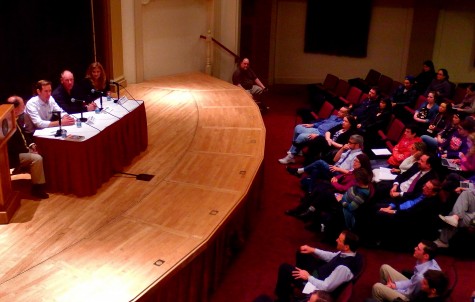Symposium leaves student athletes and journalists with much to think about
February 28, 2015
Brad Thompson, associate professor of mass communication, has just asked a question of the sports journalism symposium panel.
Chris Ballard, senior writer for Sports Illustrated, leans forward to the microphone and says, “You have to tell a story, go into depth. Just start in the moment. If you take us into the narrative, the reader can’t stop reading.”
The question he had just answered centered on keeping your articles current and relevant and entertaining in a world where attentions spans are measured in seconds.
Lindsey Schnell, a writer for Sports Illustrated, provided her own input.
“It’s really hard. As you are writing a breaking news story, you have to think, ‘What’s the big picture here? What are the long-term effects?’ You have to think like a reader, and I’m not good at that sometimes,” she said.
Linfield provides students with many opportunities to educate themselves not only in-class but also outside of it, and the first ever sports journalism symposium Feb. 26 at 7:30 p.m. was a perfect example of that.
Ballard, Schnell and Scott Brosius, Linfield baseball head coach, presented on the panel, drawing on their wisdom from the sides of the journalists and athletes.
A large part of the panel focused on interviewing athletes who didn’t want to be interviewed such as Marshawn Lynch of the Seattle Seahawks who has repeatedly used the phrase, “I’m only here so I won’t get fined” when asked questions by the media.
“The way I did it was to approach him as a human being. You want to tell their story, and you want to tell it empathetically,” Ballard said.
He pointed out how it made interviews go a lot easier when the journalist approached as a human being first and then as a journalist.
On the other side of it, Brosius pointed out that sometimes you won’t get the interview you wanted.
“Pick your time and choose when to have certain questions. You may not get the story when you wanted to,” Brosius said.
He discussed his own experience as an athlete where one of the flashier articles written about him had the headline “Struggling Brosius is atrocious.” He shared this experience with the media in order for both journalism and sports students to get a perspective on this. He did disagreed with some of what the journalist wrote and brought this up to him the next time they met.
“We ended up in a shouting match, and when it’s all said and done, what did that really accomplish?”
Schnell pointed out that as a journalist you have to be aware that you may be burning bridges, and you need to decide if that story you’re going to write is worth that.
“It’s important for me to have a good relationship with people. Your obligation is to your readers,” Schnell said.
Ballard brought up the point that no matter what you write and how you write it, someone is going to find fault with it.
To end the panel, Thompson asked a question he encourages any journalist to ask at the end of any interview: “Is there anything you would like to say that you haven’t been asked about?”
The panelists focused on finding success in a world of constant competition.
Schnell brought up a thought she had mentioned earlier.
“You have to believe you are good enough to be hired,” Schnell said.
“We have these aspirations to get to the top, and it just doesn’t happen. What separates the people that get there and the people that don’t is hard work,” Brosius said.
And Ballad ended the panel by telling students to ask themselves “Why not?” whenever an opportunity was offered because it is through those opportunities that they make it to where they want to be.
Gilberto Galvez can be reached at [email protected].

